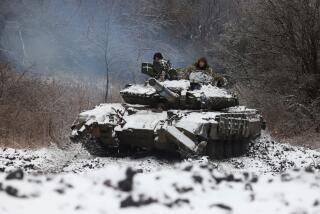Analysis : Stonewalling--a Soviet Tradition
- Share via
MOSCOW — The Soviet Union has suffered a nuclear disaster, but the Kremlin’s tight-mouthed handling has made it a political catastrophe as well.
Despite Soviet leader Mikhail S. Gorbachev’s much-discussed policy of glasnost , or openness, the authorities reverted to classic Moscow stonewalling when the Chernobyl nuclear reactor No. 4 exploded and burned.
As a result, Gorbachev’s yearlong efforts to convince the West Europeans that he is a new, more reasonable Kremlin boss appear to be seriously undermined.
For while Gorbachev declared that the nuclear age required global interdependence, the Soviet Union’s conduct in the Chernobyl case shows that it hardly can claim to be a good neighbor.
Lied to Swedes
When a radioactive cloud from the nuclear explosion was hovering over Scandinavia last Monday, the Soviet Union plain lied to Swedish diplomats and said it was not responsible.
Under tremendous pressure, however, the Soviets within hours then admitted that one of their nuclear plants had an accident that leaked radiation into the atmosphere.
Although most Western experts believe the accident occurred Friday or Saturday at the latest, the skimpy official bulletins issued by the Soviet Council of Ministers have yet to say when the fateful mishap occurred. And despite a chorus of demands from the international community, the Kremlin has yet to describe what happened or to give the levels of radiation at the plant and in neighboring areas.
Many Soviet citizens said they are surprised that the Kremlin acknowledged as much as it did, considering what it has done to suppress “bad news” in the past.
Airline crashes, for example, are rarely if ever reported in the controlled Soviet press. Even earthquakes and similar natural disasters are given only scanty attention.
Western diplomats said that one explanation for the habit of stonewalling is what they term a national inferiority complex that often results in a stubborn refusal to acknowledge that the Soviet Union could make a mistake.
Another explanation is the traditional secrecy in the Soviet system, where information is regarded as power and even the death of a Soviet leader is often not announced for 24 hours or more.
In the case of Chernobyl, there was another major reason for trying to avoid public airing of the disaster. For decades, Soviet officials and scientists have insisted that their nuclear power plants are absolutely safe and reliable, unlike those in the West. In addition, the present five-year plan calls for a doubling of nuclear power production by 1990.
Therefore, it would be embarrassing to the government and to the Communist Party hierarchy to admit that past reassurances had been wrong or too sweeping. Also, if other reactors of a similar make had to be shut down, it would seriously reduce the output of electricity.
Given the consequences of disclosure, it may have been easier for Soviet officials to do what comes naturally and that is to conceal evidence of mistakes and failures.
No Government Directory
Secrecy is endemic in Soviet life. There is no directory of government officials, for example, and no telephone book to check home numbers of subscribers.
On a strictly internal matter where foreigners are not involved, the Soviets have successfully suppressed news of an airline crash, for example.
Since Gorbachev took power, however, he has promised to make more information available. The state-run newspapers have asked why the media can report on disasters abroad but avoid mentioning any within the Soviet Union.
The importance of adequate public information to dispel false rumors has been stressed as part of the new campaign for openness.
The Chernobyl episode has shown dramatically the limits of glasnost, however. British Prime Minister Margaret Thatcher said it underlines the importance of strict verification clauses in any arms control agreement with the Soviet Union, given the example of how difficult it is to pry information out of the Kremlin.
It is not the first time that the Soviet Union has suffered a loss in prestige because it equivocated and failed to be candid about its actions.
When a Korean commercial airliner was shot down by Soviet jets in September, 1983, for example, the Kremlin at first denied that it was responsible. Only later, and only in piecemeal fashion, did it acknowledge that Soviet warplanes downed the airliner, killing all 269 people aboard.
It is hard to imagine how the policy-making officials ever thought that the Chernobyl disaster could be kept under wraps, particularly when radioactivity had spread far beyond the Soviet borders.
But the record shows that they did attempt concealment--and failed--while an increasingly skeptical world was watching.
More to Read
Sign up for Essential California
The most important California stories and recommendations in your inbox every morning.
You may occasionally receive promotional content from the Los Angeles Times.













